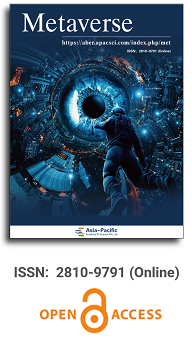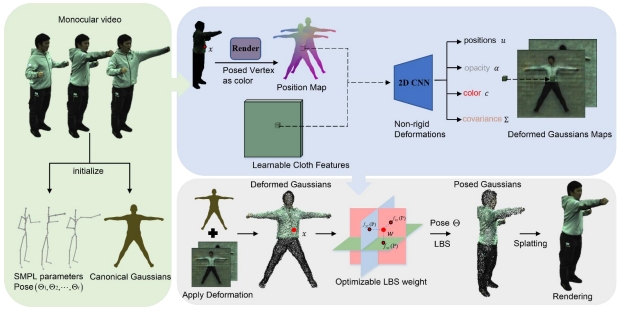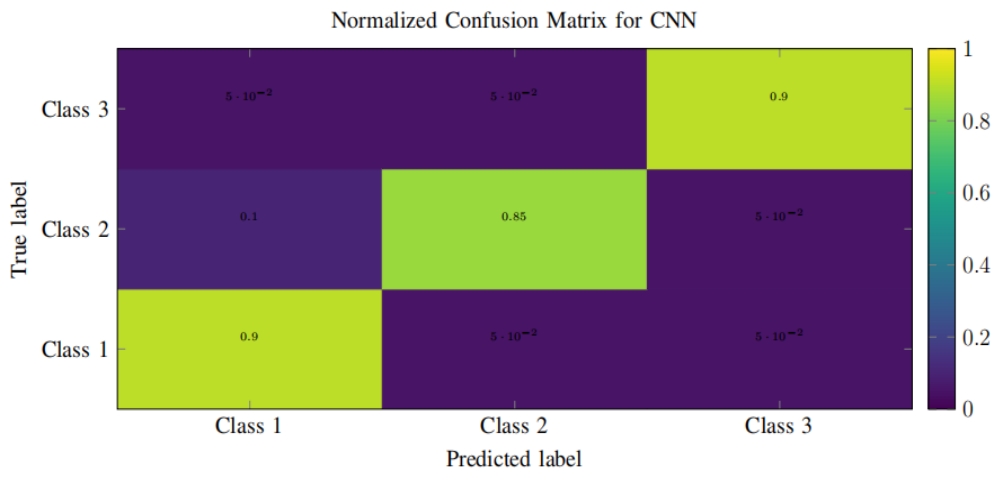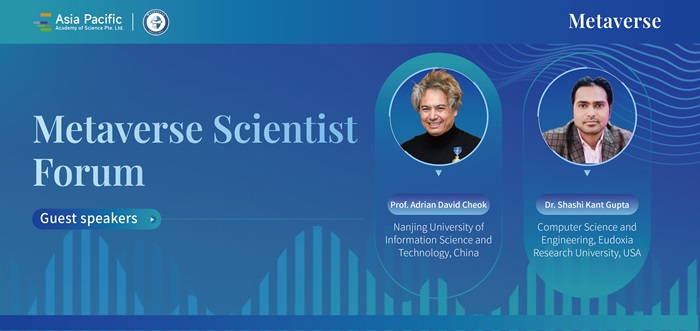
Asia Pacific Academy of Science Pte. Ltd. (APACSCI) specializes in international journal publishing. APACSCI adopts the open access publishing model and provides an important communication bridge for academic groups whose interest fields include engineering, technology, medicine, computer, mathematics, agriculture and forestry, and environment.



 Metavere | Metaverse Scientist Forum
#VooV Meeting VooV ID: 688-583-586 #Zoom Meeting Zoom ID: 326 530 1077 Password: metaverse Chairmen Dean, School of Artificial Intelligence (School of Future Technology), Nanjing University of Information Science & Technology, China Vice Chairman, China Virtual Reality and Visualization Innovation Platform Director of Jiangsu Intelligent Media Industry Research Institute Editor-in-Chief of Metaverse
Invited Moderator: Dr. Wenxiao Wang Master's supervisor, School of Humanities and Arts, Macau University of Science and Technology, China ACM Member CCF Member Keynote Speaker Nanjing University of Information Science and Technology, China Director of the Imagineering Institute, Malaysia CEO of Nikola Tesla Technologies Corporation Full Member into Sigma Xi USA, The Scientific Research Honor Society Topic: Everysense Everywhere Human Communication Abstract: This talk outlines new facilities that are arising in the hyperconnected internet era within human media spaces. This allows new embodied interaction between humans, species, and computation both socially and physically, with the aim of novel interactive communication and entertainment. Humans can develop new types of communication environments using all the senses, including touch, taste, and smell, which can increase support for multi-person multi-modal interaction and remote presence. In this talk, we present an alternative ubiquitous computing environment and space based on an integrated design of real and virtual worlds. We discuss some different research prototype systems for interactive communication, culture, and play.
Guest Speaker Dr. Shashi Kant GuptaPost-Doctoral Fellow and Researcher, Computer Science and Engineering, Eudoxia Research University, USA Editor-in-Chief of International Journal of Data Informatics and Intelligent computing (IJDIIC), International Journal of Emerging Technologies in Computer and Communication (IJETCC) CEO of CREP PVT. LTD. Topic: Developing Responsible Researchers in the AI World Abstract: In the rapidly evolving landscape of artificial intelligence (AI), the development of responsible researchers is paramount to ensuring ethical and sustainable advancements. This paper explores the multifaceted approach required to cultivate researchers who are not only proficient in AI technologies but also deeply aware of the ethical implications and societal impacts of their work. The context of this study is set against the backdrop of increasing AI integration across various sectors, highlighting the urgent need for a framework that balances innovation with responsibility. Central to this discourse is the identification of key competencies that define a responsible AI researcher. These include a strong foundation in technical skills, an understanding of ethical principles, and the ability to engage in interdisciplinary collaboration. The paper examines existing literature on AI ethics and responsible innovation, identifying gaps in current educational and professional training programs that often overlook the importance of ethical considerations in AI research. The methodology involves a comprehensive review of educational curricula and professional development programs, alongside interviews with leading AI researchers and ethicists. The findings reveal a significant disparity between technical training and ethical education, underscoring the need for integrated learning models that incorporate ethical reasoning and societal impact assessments into AI research training. The implications of this study are profound, suggesting that the future of AI research hinges on the ability to produce researchers who are not only technically adept but also ethically conscious. The paper advocates for policy changes in educational institutions and research organizations to prioritize ethical training and interdisciplinary collaboration. By fostering a culture of responsibility, the AI community can ensure that technological advancements contribute positively to society and mitigate potential risks. In conclusion, developing responsible researchers in the AI world is not merely an academic exercise but a societal imperative. This paper calls for a concerted effort from educators, policymakers, and industry leaders to create an environment where ethical considerations are integral to AI research and development. Through such efforts, the AI community can pave the way for innovations that are both groundbreaking and beneficial to humanity.
|

Prof. Zhigeng Pan
Professor, Hangzhou International Innovation Institute (H3I), Beihang University, China

Prof. Jianrong Tan
Academician, Chinese Academy of Engineering, China
Conference Time
December 15-18, 2025
Conference Venue
Hong Kong Convention and Exhibition Center (HKCEC)
...
Metaverse Scientist Forum No.3 was successfully held on April 22, 2025, from 19:00 to 20:30 (Beijing Time)...
We received the Scopus notification on April 19th, confirming that the journal has been successfully indexed by Scopus...
We are pleased to announce that we have updated the requirements for manuscript figures in the submission guidelines. Manuscripts submitted after April 15, 2025 are required to strictly adhere to the change. These updates are aimed at ensuring the highest quality of visual content in our publications and enhancing the overall readability and impact of your research. For more details, please find it in sumissions...






.jpg)
.jpg)

